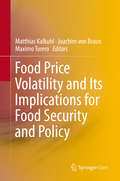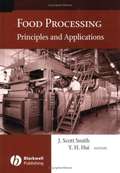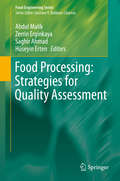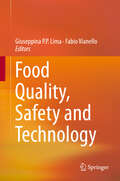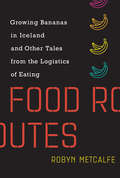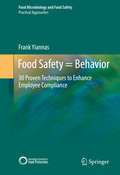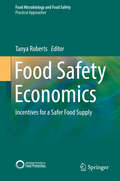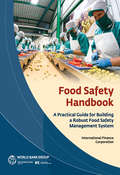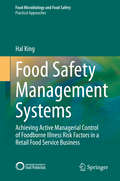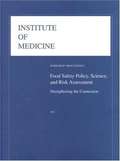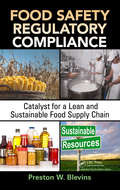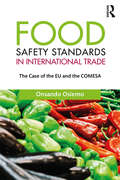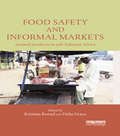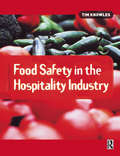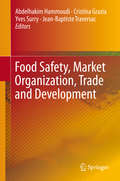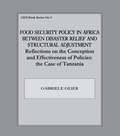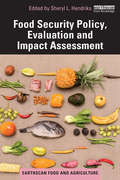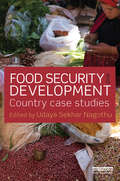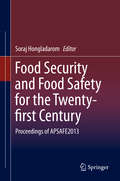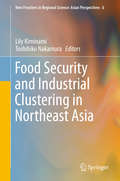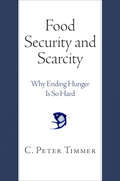- Table View
- List View
Food Price Volatility and Its Implications for Food Security and Policy
by Matthias Kalkuhl Joachim Braun Maximo ToreroThis book provides freshinsights into concepts, methods and new research findings on the causes ofexcessive food price volatility. It also discusses the implications for foodsecurity and policy responses to mitigate excessive volatility. The approachesapplied by the contributors range from on-the-ground surveys, to paneleconometrics and innovative high-frequency time series analysis as well ascomputational economics methods. It offers policy analysts and decision-makersguidance on dealing with extreme volatility.
Food Processing: Principles and Applications (3rd Edition)
by J. Scott Smith Y. H. HuiRenowned international academicians and food industry professionals have collaborated to create Food Processing: Principles and Applications. This practical, fully illustrated resource examines the principles of food processing and demonstrates their application by describing the stages and operations for manufacturing different categories of basic food products. Ideal as an undergraduate text, Food Processing stands apart in three ways: The expertise of the contributing authors is unparalleled among food processing texts today. The text is written mostly by non-engineers for other non-engineers and is therefore user-friendly and easy to read. It is one of the rare texts to use commodity manufacturing to illustrate the principles of food processing. As a hands-on guide to the essential processing principles and their application, this book serves as a relevant primary or supplemental text for students of food science and as a valuable tool for food industry professionals.
Food Processing: Strategies for Quality Assessment
by Abdul Malik Zerrin Erginkaya Saghir Ahmad Hüseyin ErtenThe aim of the food processing is to ensure microbiological and chemical safety of foods, adequate nutrient content and bioavailability and acceptability to the consumer with regard to sensory properties and ease of preparation. Processing may have either beneficial or harmful effects on these properties, so each of these factors must be taken into account in the design and preparation of foods. This book offers a unique dealing with the subject and provides not only an update of state-of-the art techniques in many critical areas of food processing and quality assessment, but also the development of value added products from food waste, safety and nanotechnology in the food and agriculture industry and looks into the future by defining current obstacles and future research goals. This book is not intended to serve as an encyclopedic review of the subject. However, the various chapters incorporate both theoretical and practical aspects and may serve as baseline information for future research through which significant development is possible.
Food Quality, Safety and Technology
by Giuseppina P. P. Lima Fabio VianelloThe present book collects selected contributions from researchers working in the field of food science, and participating at the second spring school for "Food Quality, Safety and Technology," which was held in Botucatu (São Paulo, Brazil), from September 24th to 27th, 2012, at the Botucatu Campus of the Universidade Estadual Paulista "Julio Mesquita Filho" (UNESP). The goal of the conference was to provide a scientific forum covering large areas of agronomy, nutrition, food science and technology, veterinary and other areas related to food technology development. Teachers, professionals, graduate and post-graduate students in Food Science; Food and Agriculture Engineering; Veterinary, Science and Food Technology and related areas were addressed by providing an exchange of knowledge and technologies. The initiative aimed to establish uniform, globally recognized scientific principles on food safety and quality, which could be consistently applied to industry and production sectors and stakeholders, taking into account that effective food control systems are essential to protecting the health and safety of domestic consumers, to guaranteeing the safety and quality of foods entering international trade, and to ensuring that imported foods conform to national requirements.
Food Resistance Movements: Journeying Through Alternative Food Networks (Alternatives and Futures: Cultures, Practices, Activism and Utopias)
by Ferne EdwardsThis book examines food resistance movements as a form of alternative food network, charting the author’s journey as a cultural anthropologist through three food resistance movements.In Australia, freegans’ consumption of ‘garbage’ in the food waste movement of the early 2000s reveals the extent of food going to waste from commercial sources while people go hungry. In contrast, Venezuela’s food sovereignty movement is part of a national transition from a capitalist to socialist economy, highlighting processes of decentralisation, collectivisation, and government-grassroots’ coalitions. The study of autonomous spaces in Catalonia illuminates how food sharing can enable people to live their politics, as well as the centrality of issues around urban governance, consumption, technology and use of space to food resistance efforts. This engaging volume brings an important and engaging contribution to current discussions around the transition to just and sustainable food systems.
Food Routes: Growing Bananas in Iceland and Other Tales from the Logistics of Eating
by Robyn MetcalfeFinding opportunities for innovation on the path between farmer and table. Even if we think we know a lot about good and healthy food—even if we buy organic, believe in slow food, and read Eater—we probably don't know much about how food gets to the table. What happens between the farm and the kitchen? Why are all avocados from Mexico? Why does a restaurant in Maine order lamb from New Zealand? In Food Routes, Robyn Metcalfe explores an often-overlooked aspect of the global food system: how food moves from producer to consumer. She finds that the food supply chain is adapting to our increasingly complex demands for both personalization and convenience—but, she says, it won't be an easy ride. Networked, digital tools will improve the food system but will also challenge our relationship to food in anxiety-provoking ways. It might not be easy to transfer our affections from verdant fields of organic tomatoes to high-rise greenhouses tended by robots. And yet, argues Metcalfe—a cautious technology optimist—technological advances offer opportunities for innovations that can get better food to more people in an increasingly urbanized world. Metcalfe follows a slice of New York pizza and a club sandwich through the food supply chain; considers local foods, global foods, and food deserts; investigates the processing, packaging, and storage of food; explores the transportation networks that connect farm to plate; and explains how food can be tracked using sensors and the Internet of Things. Future food may be engineered, networked, and nearly independent of crops grown in fields. New technologies can make the food system more efficient—but at what cost to our traditionally close relationship with food?
Food Safety = Behavior
by Frank YiannasThis book helps in Achieving food safety success which requires going beyond traditional training, testing, and inspectional approaches to managing risks. It requires a better understanding of the human dimensions of food safety. In the field of food safety today, much is documented about specific microbes, time/temperature processes, post-process contamination, and HACCP-things often called the hard sciences. There is not much published or discussed related to human behavior-often referred to as the "soft stuff. " However, looking at foodborne disease trends over the past few decades and published regulatory out-of-compliance rates of food safety risk factors, it's clear that the soft stuff is still the hard stuff. Despite the fact that thousands of employees have been trained in food safety around the world, millions have been spent globally on food safety research, and countless inspections and tests have been performed at home and abroad, food safety remains a significant public health challenge. Why is that? Because to improve food safety, we must realize that it's more than just food science; it's the behavioral sciences, too. In fact, simply put, food safety equals behavior. This is the fundamental principle of this book. If you are trying to improve the food safety performance of a retail or food service establishment, an organization with thousands of employees, or a local community, what you are really trying to do is change people's behavior. The ability to influence human behavior is well documented in the behavioral and social sciences. However, significant contributions to the scientific literature in the field of food safety are noticeably absent. This book will help advance the science by being the first significant collection of 50 proven behavioral science techniques, and be the first to show how these techniques can be applied to enhance employee compliance with desired food safety behaviors and make food safety the social norm in any organization.
Food Safety Economics: Incentives For A Safer Food Supply (Food Microbiology and Food Safety)
by Tanya RobertsThis book examines the economic incentives for food safety in the private marketplace and how public actions have helped shape those incentives. Noted contributors analyze alternative public health protection efforts and the benefits and costs associated with these actions to understand: why an excess of foodborne illness occurs what policies have worked best how regulations have evolved what the path forward to better control of pathogens in the U.S. and the international food supply chain might look like While the first third of the book builds an economic framework, the remaining chapters apply economics to specific food safety issues. Numerous chapters explore economic decision making within individual companies, revealing the trade-offs of the costs of food safety systems to comply with regulations, vs. non-compliance which carries costs of possible penalties, reputation damage, legal liability suits, and sales reduction. Pathogen control costs are examined in both the short run and long run. The book's unique application of economic theory to food safety decision making in both the public and private sectors makes it a key resource for food safety professionals in academia, government, industry, and consumer groups around the world. In addition to Benefit/Cost Analysis and economic incentives, other economic concepts are applied to food safety supply chains, such as, principal-agent theory and the economics of information. Authors provide real world examples, from Farm-to-Fork, to showcase these economic concepts throughout the book.
Food Safety Handbook: A Practical Guide for Building a Robust Food Safety Management System
by International Finance CorporationThe Food Safety Handbook: A Practical Guide for Building a Robust Food Safety Management System, contains detailed information on food safety systems and what large and small food industry companies can do to establish, maintain, and enhance food safety in their operations. This new edition updates the guidelines and regulations since the previous 2016 edition, drawing on best practices and the knowledge IFC has gained in supporting food business operators around the world. The Food Safety Handbook is indispensable for all food business operators -- anywhere along the food production and processing value chain -- who want to develop a new food safety system or strengthen an existing one.
Food Safety Management Systems: Achieving Active Managerial Control of Foodborne Illness Risk Factors in a Retail Food Service Business (Food Microbiology and Food Safety)
by Hal KingThis foodborne disease outbreak prevention manual is the first of its kind for the retail food service industry. Respected public health professional Hal King helps the reader understand, design, and implement a food safety management system that will achieve Active Managerial Control in all retail food service establishments, whether as part of a multi-restaurant chain or for multi-restaurant franchisees. According to the most recently published data by the Centers for Disease Control and Prevention (CDC), retail food service establishments are the most commonly reported locations (60%) leading to foodborne disease outbreaks in the United States every year. The Food and Drug Administration (FDA) has reported that in order to effectively reduce the major foodborne illness risk factors in retail food service, a food service business should use Food Safety Management Systems (FSMS); however less than 11% of audited food service businesses in a 2018 report were found using a well-documented FSMS. Clearly, there needs to be more focus on the prevention of foodborne disease illnesses and outbreaks in retail food service establishments. The purpose of this book is to help retail food service businesses implement FSMS to achieve Active Managerial Control (AMC) of foodborne illness risk factors. It is a key resource for retail professionals at all levels of the retail food service industry, and those leaders tasked to build and manage food safety departments within these organizations.
Food Safety Policy, Science, and Risk Assessment: Workshop Proceedings
by Food ForumThe National Academies Press (NAP)--publisher for the National Academies--publishes more than 200 books a year offering the most authoritative views, definitive information, and groundbreaking recommendations on a wide range of topics in science, engineering, and health. Our books are unique in that they are authored by the nation's leading experts in every scientific field.
Food Safety Regulatory Compliance: Catalyst for a Lean and Sustainable Food Supply Chain (ISSN #47)
by Preston W. BlevinsThe global sourcing of ingredients has created complex supply chains, significant management challenges, and additional regulatory compliance requirements. This places tremendous pressure on food manufacturers, many of whom lack the knowledge, concepts, techniques, and procedures to comply with these increased requirements. Providing a roadmap for
Food Safety Standards in International Trade: The Case of the EU and the COMESA
by Onsando OsiemoFood safety has become a major concern for consumers in the developed world and Europe in particular. This has been highlighted by the recent spate of food scares ranging from the BSE (mad cow) crisis to Chinese melamine contamination of baby formula. To ensure food safety throughout Europe, stringent food safety standards have been put in place ‘from farm to fork’. At the same time, poor African countries in the COMESA rely on their food exports to the European market to achieve their development goals yet have difficulty meeting the EU food safety standards. This book examines the impact of EU food safety standards on food imports from COMESA countries. It also critically examines both EU and COMESA food safety standards in light of the WTO SPS Agreement and the jurisprudence of the WTO panels and Appellate Body. The book makes ground-breaking proposals on how the standards divide between the EU and the COMESA can be bridged and discusses the impact of EU food safety standards on food imports from poor African countries.
Food Safety Standards in International Trade: The Case of the EU and the COMESA
by Onsando OsiemoFood safety has become a major concern for consumers in the developed world and Europe in particular. This has been highlighted by the recent spate of food scares ranging from the BSE (mad cow) crisis to Chinese melamine contamination of baby formula. To ensure food safety throughout Europe, stringent food safety standards have been put in place ‘from farm to fork’. At the same time, poor African countries in the COMESA rely on their food exports to the European market to achieve their development goals yet have difficulty meeting the EU food safety standards. This book examines the impact of EU food safety standards on food imports from COMESA countries. It also critically examines both EU and COMESA food safety standards in light of the WTO SPS Agreement and the jurisprudence of the WTO panels and Appellate Body. The book makes ground-breaking proposals on how the standards divide between the EU and the COMESA can be bridged and discusses the impact of EU food safety standards on food imports from poor African countries.
Food Safety and Informal Markets: Animal Products in Sub-Saharan Africa
by Delia Grace Kristina RoeselAnimal products are vital components of the diets and livelihoods of people across sub-Saharan Africa. They are frequently traded in local, unregulated markets and this can pose significant health risks. This volume presents an accessible overview of these issues in the context of food safety, zoonoses and public health, while at the same time maintaining fair and equitable livelihoods for poorer people across the continent. The book includes a review of the key issues and 25 case studies of the meat, milk, egg and fish food sectors drawn from a wide range of countries in East, West and Southern Africa, as part of the "Safe Food, Fair Food" project. It describes a realistic analysis of food safety risk by developing a methodology of ‘participatory food safety risk assessment’, involving small-scale producers and consumers in the process of data collection in a data-poor environment often found in developing countries. This approach aims to ensure market access for poor producers, while adopting a realistic and pragmatic strategy for reducing the risk of food-borne diseases for consumers.
Food Safety in the Hospitality Industry
by Tim KnowlesFood Safety in the Hospitality Industry is a user-friendly guide to current food safety and hygiene legislation and is vital reading for all those involved in food handling and preparation. Using frequent practical examples, the text outlines and explains what you need to know about the following areas: · The key legislation and legal background in easy-to-follow terms - includes a comparison of the UK and European Union.· Safe food handling in practice - an easy reference source for all areas of a catering operation, including food service and labelling, storage and temperature controls and health and safety. · The application of food safety policies in business - practical guidance on food hazard analysis, including planning, implementation, control and measurement. Ideal reading for the core food safety component of hospitality management and catering degrees, the text is also a useful reference for industry practitioners who need to be up to speed on the legal requirements and best practice for maintaining safety and hygiene in the workplace.
Food Safety, Market Organization, Trade and Development
by Jean-Baptiste Traversac Abdelhakim Hammoudi Cristina Grazia Yves SurryThis book provides an economic perspective on the effects of food safety standards on international trade. Focusing on food safety regulation at an international level and private food safety standards, the authors use contemporary methodologies to analyze supply chain structures and organization as well as food-chain actors' strategies. They also evaluate the effects of these on both consumer health and developing countries' access to international markets. The book provides ideas, suggestions and policy recommendations for reconciling economic interests with consumer health, which will be of special interest to academics as well as to practitioners.
Food Security Policy in Africa Between Disaster Relief and Structural Adjustment: Reflections on the Conception and Effectiveness of Policies; the case of Tanzania
by Gabriele GeierAccording to the FAO, one person in three in sub-Saharan Africa suffers from malnutrition, and one in seven is in danger of dying. Most African countries no longer seem capable of ensuring that their people have access to sufficient food. Given the failure of past efforts the objectives of food security policies and their effectiveness have to be reconsidered. This book shows that the debate on food security policies has changed with the passage of time. The entitlement debate triggered by A. Sen had a major influence on this change but, the bearing of socio-economic structures on the food security of African households and their individual members are still not fully recognised.
Food Security Policy, Evaluation and Impact Assessment (Earthscan Food and Agriculture)
by Sheryl. L. HendriksThis book offers an essential, comprehensive, yet accessible reference of contemporary food security discourse and guides readers through the steps required for food security analysis. Food insecurity is a major obstacle to development and achievement of the Sustainable Development Goals. It is a complex issue that cuts across traditional sectors in government and disciplines in academia. Understanding how multiple elements cause and influence food security is essential for policymakers, practitioners and scholars. This book demonstrates how evaluation can integrate the four elements of food security (availability, access, nutrition and resilience) and offers practical tools for policy and programme impact assessment to support evidence-based planning. Aimed at researchers, postgraduates and those undertaking professional development in food studies, agricultural economics, rural development, nutrition and public health, the book is key reading for those seeking to understand evidence-based food security analysis.
Food Security and Development: Country Case Studies
by Udaya Sekhar NagothuThe global food system is characterized by large numbers of people experiencing food insecurity and hunger on the one hand, and vast amounts of food waste and overconsumption on the other. This book brings together experiences from different countries addressing the challenges associated with food security. Seen through various disciplinary lenses the different cases included are countries at various stages of food security, with diverse stories of success as well as failures in their efforts. China, Brazil and India, as well as less developed countries in Africa and Asia, such as Malawi, Ethiopia, Tanzania, Myanmar, Bangladesh and the Philippines. The authors pay special attention to the environmental and socio-economic challenges in the respective chapters and how they contribute to food insecurity. Each of the case studies identifies and analyzes which factors or drivers (environmental, economic, policy, technology, markets) have been the most powerful shapers of the food system and their future impact. The case studies identify interventions at regional, national and local level that contribute positively to food security, highlighting solutions that are effective and easy to implement for all levels of decision makers, from farmers to policy makers. Overall, the book provides insights in order to foster a greater understanding of the issues surrounding food security and support progress towards the goal of a sustainable food system for all.
Food Security and Food Safety for the Twenty-first Century
by Soraj HongladaromThis book is a collection of selected papers that were presented at the First International Conference of the Asia-Pacific Society for Agricultural and Food Ethics (APSAFE 2013), which was held at Chulalongkorn University from November 28 - 30, 2013. The papers are interdisciplinary, containing insights into food security and food ethics from a variety of perspectives, including, but not limited to, philosophy, sociology, law, sociology, economics, as well as the natural sciences. The theme of the conference was to consider the interplay and balance between food security and food ethics as the world approaches the middle part of the twenty-first century.
Food Security and Industrial Clustering in Northeast Asia
by Lily Kiminami Toshihiko NakamuraThis book integrates diversified methodologies of area studies, regional economic development, regional science, and related fields to draw up a strategy for forming the "regional food industrial cluster" in Northeast Asia. This is done by assigning "innovation" to a core concept, with the basic problem of food security as the horizontal axis and the areas of Northeast Asia as the vertical axis. Specifically, the principle of "collaborative advantage" as a key factor is extracted from case studies on food industrial clustering in each area. As a final objective, a practical policy recommendation is presented while the theorization of the industrial cluster is developed. Therefore it is also a challenge to the old and new issue of food security which has been argued until now.
Food Security and Land Use Change under Conditions of Climatic Variability: A Multidimensional Perspective
by Victor R. Squires Mahesh K. GaurThis volume analyzes the global challenges of food security, land use changes, and climate change impacts on food production in order to recommend sustainable development policies, anticipate future food services and demands, and identify the economic benefits and trade-offs of meeting food security demands and achieving climate change mitigation objectives. The key points of analysis that form the conclusions of this book are based on measuring the quantity and quality of land and water resources, and the rate of use of sustainable management of these resources in the context of socio-economic factors, including food security, poverty, and climate change impacts. In six parts, readers will learn about these crucial dimensions of the affects of climate change on food security, and will gain a better understanding of how to assess the trade-offs when combating multiple climate change challenges and how to develop sustainable solutions to these problems. The book presents multidimensional perspectives from expert contributors, offering holistic and strategic approaches to link knowledge on climate change and food security with action in the form of policy recommendations, with a focus on sociological and socio-economic components of climate change impacts. The intended audience of the book includes students and researchers engaged in climate change and food security issues, NGOs, and policy makers.
Food Security and Scarcity: Why Ending Hunger Is So Hard
by C. Peter TimmerIn countries that have managed to confront and cope with the challenges of food insecurity over the past two centuries, markets have done the heavy lifting. Markets serve as the arena for allocating society's scarce resources to meet the virtually unlimited needs and desires of consumers: no other mechanism can efficiently signal fluctuations in scarcity and abundance, the cost of labor, or the value of commodities. But markets fail at tasks that society regards as important; thus, governments have had to intervene to stabilize the economic environment and provide essential public goods, such as transportation and communications networks, agricultural research and development, and access to quality health and educational facilities. Ending hunger requires that each society find the right balance of market forces and government interventions to drive a process of economic growth that reaches the poor and ensures that food supplies are readily, and reliably, available and accessible to even the poorest households. But locating that balance has been a major challenge for many countries, and seems to be getting more difficult as the global economy becomes more integrated and less stable.Food Security and Scarcity explains what forms those challenges take in the long run and short term and at global, national, and household levels. C. Peter Timmer, best known for his work on the definitive text Food Policy Analysis, draws on decades of food security research and analysis to produce the most comprehensive and up-to-date assessment of what makes a productive, sustainable, and stable food system—and why so many countries have fallen short. Poverty and hunger are different in every country, so the manner of coping with the challenges of ending hunger and keeping it at bay will depend on equally country-specific analysis, governance, and solutions. Timmer shows that for all their problems and failures, markets and food prices are ultimately central to solving the problem of hunger, and that any coherent strategy to improve food security will depend on an in-depth understanding of how food markets operate.Published in association with the Center for Global Development.
Food Security and Social Protection for the Rural Poor in China (China Perspectives)
by Ling ZhuEconomic growth and its relevant subjects have been given the first priority in the research agenda since China initiated economic reforms in 1978, while the topics of social protection and gender equality have been largely left at the periphery for a long period. This book is a collection of evidence-based studies conducted mainly in poor areas of rural China during the recent two decades. Based on individual interviews and sample data analyses, this book emphasizes the importance of cooperative organizations to poverty reduction, and puts forward that gender equality is closely related with sustainable development. In addition, it addresses the issues of food security and elimination of social exclusion - the key to bridging economic divide. It also studies social protection, including basic health protection system, nutrition and healthcare for children, old age security for landless farmers and rural migrant workers. By providing first-hand accounts of different vulnerable groups, such as the poor, women, migrant workers, ethnic minorities and small farmers, this book offers valuable insights into studies of contemporary Chinese society and economy.
